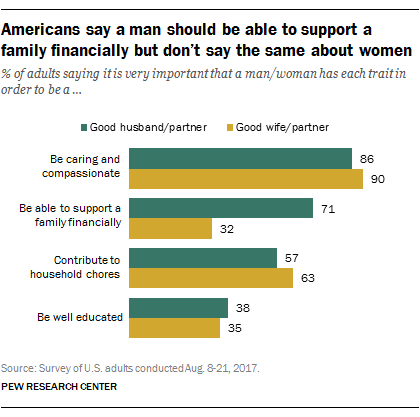Protecting Male Purpose in a Feminist World
Rule #1: Whatever pro-feminists advise, do the opposite
It’s always a bad idea to tweet an article without reading it to the end. In my case, the article was about the last words of suicidal men. A 2015 study had found that “useless” and “worthless” were the two most common epithets of men who killed themselves.
I tweeted that such self-condemnations amount to a “societal indictment” for which feminism is largely responsible. It is feminism, after all, that pushed “A woman needs a man like a fish needs a bicycle,” that has repeatedly called men “obsolete” and the future female, and has formulated laws and policies to push men out of their jobs and families. Society, I tweeted, needs to love men better.
It was only when a number of commenters pushed back, critiquing the article and noting that “Men need purpose more than love” that I went back and read the whole thing.
The article, by popular author and illustrator Carlyn Beccia, isn’t about loving men and certainly not about criticizing feminist policies or affirming male purpose. Its feminist-compliant subheading actually laments “how we indoctrinate men as providers.” With now-dreary predictability, the article develops an Alice-in-Wonderland argument: men need to get used to being useless.
Beccia takes one of the most fundamental of male roles through history—that of provider—and tells men to be thankful it’s gone. Men don’t need to be providers anymore, she claims, and their salvation will come when they are—well—more like women, or at least less typically masculine. To be masculine is to be motivated by “risk-taking,” which Beccia lumps in with a list of other supposed negatives such as “aggression, […] violence, and sexism.” She omits to mention that such qualities have also been necessary for social order and invention. According to Beccia, women have a commendably flexible sense of purpose because they aren’t bothered by the need to earn their way.
In short, men who kill themselves because they have been made to feel useless should recognize that feeling useful was never much more than a patriarchal hoax, to be shucked off with other outdated fashions like “poodle skirts and bullet bras.” Lest any man seek guidance from popular prophets of masculine purpose, she lists three such men—Andrew Tate, Joe Rogan, and Jordan Peterson (!)—to dismiss them all as “carnival barkers” who “hock their version of masculinity as magical elixirs.”
What I had thought was a wake-up call about the need to protect male purpose was in fact a feminist tract advising men to accept redundancy.
Beccia’s stated concern for male pain may be genuine, but contempt for masculinity and indifference to the effects of feminism are always just below the article’s surface. She accepts that masculinity is primarily a social construct, something defined and reinforced by culture rather than rooted in male psycho-biology, and she is thus perfectly comfortable advocating its near-complete overhaul. Though she distances herself from the harshest strands of feminist orthodoxy, she accepts that masculinity is mainly dangerous and unhealthy not only for men but (particularly) for women and children—though she never does explain why, if this is so, generations of single mothers and feminist schoolteachers, writers, therapists, and social workers have not succeeded in stamping it out or even modifying it.
Beccia is confident that men are the authors of their own misfortune. They drive themselves “in a relentless pursuit of some bogus hegemonic definition of masculinity that eventually kills them earlier than women.” Ugh. Beccia doesn’t explain what is “bogus” about a self-sacrificial work ethic that propels men to care for their families. Moreover, a good number of these men, unhappily divorced and paying court-ordered alimony and child support, have little choice but to meet the financial obligations a judge has deemed appropriate. Choosing to eschew the provider role in such circumstances could well land them in prison or at least cut them off from involvement in their children’s lives. Other men are working overtime precisely to avoid the prospect of an expensive, personally devastating divorce. Beccia should ask women how much they enjoy being married to men who don’t provide. She does mention that marriages in which women out-earn their husbands are 50% more likely than other marriages to end in divorce, but she leaves the impression that it is the (insecure and toxic) men who are leaving, not the other way around. In reality, the vast majority of divorces are initiated by dissatisfied wives.
The author’s own evidence repeatedly undermines her assurances that provider ideology is a thing of the past. She notes a survey showing that the vast majority of men—81% of men with a high school education or less; and even 61% of men with four years of college indoctrination (let that sink in)—subscribe to what she considers “anachronistic ideals of masculinity” in that they believe a man should “support a family financially.” How can such ideals be anachronistic when they remain a living and meaningful conception for such significant numbers of people? Again, it’s not only men: Beccia notes that 71% of both men and women believe that men should provide for their families. Beccia is confident that men need to be re-programmed, but she never mentions how women can be convinced to stop holding men to the provider standard.
Neither does she explain how women will take over from men as providers given that women, unlike men, tend to find meaning in relationships rather than achievement. On this point, by the way, she tut-tuts that 43% of women find meaning in children and grandchildren while only 24% of men (allegedly) do, while not mentioning that custody realities, which see mothers able to win most contested custody battles, mean that any father who makes his children his primary source of purpose is setting himself up for heartbreak. Though Beccia presents female attitudes as superior, they might be seen as such only if economic productivity, efficiency, and overall affluence don’t matter. Like so many commenters today, Beccia seems to have no idea that the enormous wealth and technological innovation western people enjoy was neither accidental nor inevitable but was built on the backs of men working—sometimes into early graves—to pursue what she dismisses as “bogus hegemonic masculinity.”
Ours is a society that not only flourishes by exploiting men (and has always done so) but now also denies the fact, as Janet Bloomfield demonstrated in her brilliant article “What Would Happen if No Men Showed Up for Work Tomorrow,” using data from the American Bureau of Labor Statistics to highlight the crucial and largely unheralded work men do in mostly-male, highly technical, and frequently dangerous occupations.
Beccia’s prescription is worse than useless if providing is an in-built feature of the male psyche, as some respected researchers suggest it is, and as even “bad” men like Andrew Tate are able to recognize. Telling men that they need to modernize their instincts is like telling a childless woman longing for motherhood that she’d be better off, in light of overpopulation, learning a trade. Men need purpose and validation for their distinctive contributions, as authors Paul Nathanson and Katherine Young have argued; and anyone seriously interested in suicide prevention needs to recognize that loving men involves protecting their purpose.
Beccia presents options simplistically so that her stance seems the only one possible, telling us that “Liberals’ solution is to castigate men as having ‘toxic masculinity,’ while conservatives want to turn back the clock on women’s rights as if equality is a zero sum game.” But she presents merely a softer version of the liberal solution, in which men are prevented from determining their own lives, and “women’s rights”—actually unfair privileges—are falsely equated with equality. Men’s human rights should at least include the right to strive and achieve without legal discrimination, and if that means rolling back many of the dubious gains of the women’s movement—affirmative action hiring, sex privileges in law, the family court fiasco, and #MeToo—then such should proceed apace. Recognizing the male role in building and maintaining civilization and family life would be a first step.






The utter hypocrisy of the feminists is gobsmacking. Note that women's preference for high-earning men is as strong as ever, as shown in online dating surveys. Years ago I worked as an online dating coach and had to deal with all the older professional divorced women who were nicely set up having received the family home as part of the divorce settlement. Yet most were unwilling to even consider taking on a man who had less assets than their own. Many of these women had spent years depending on a man's earnings, when they had young children, but they refused to contemplate the fact that now it could be their turn.
I love your writing Janice. Precise, balanced, and inspiring. It is never mean spirited and honors both genders.